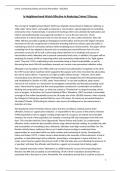Crime, Community Safety and Crime Prevention - SOC2061
Is Neighbourhood Watch Effective in Reducing Crimes? Discuss.
The concept of ‘Neighbourhood Watch’ (NW) was originally characterised in Oakland, California in
1966 under ‘Home Alert’, and sought to advocate a ‘new localism’ agenda approach to controlling
community crime. Fundamentally, it consisted of meetings which were attended by both police and
citizens and predominantly encouraged all members to “act as the eyes and ears” of law
enforcement in a bid to decrease levels of crime by means of a less costly investment. Since the
1960s, NW has provoked a significant ideological transformation and become the largest voluntary
movement in the UK; recognised by its distinctive branding and heavy reliance upon the public in
maintaining a level of community cohesion whilst mediating local criminal activity. This paper will be
evaluating how it has adapted to become such an omnipresent and well-known form of crime
prevention across the UK as well as discussing critical opinions on its methods and success of
interventions which ultimately aim to prevent community-level crime. In addition, this paper will be
analysing the impact of NW on improving police and community relationships in the “fight against
crime”7(Laycock, 1995), emphasising crime prevention being a shared responsibility, as well as
discussing how much NW still contributes towards our current crime prevention initiatives today.
Although it was founded in the 1960s, NW only received real authoritative recognition in the UK in
the 1987 Conservative manifesto which supported the popular anti-crime movement by advocating
the role of active citizens; “A general can’t fight a battle without troops”. 1 (Moores, 2017) After
incorporating many elements of Staged Methodology, it was adapted into the Metropolitan police
and established in Cheshire in 1982, under ‘Home Watch’. It uses the traditional, deep rooted
interest of civic activism as a mechanism to strengthen communities and thereby promoting social
order. Many theorists argue that this novel proposition consisted of a combination of neoliberal
thinking and conservative values, or what was coined as ‘Thatcherism’ to target increasing crimes
such as burglary. At the time, the Central Statistical Office 6 (Newburn, 2007) recorded a remarkable
coverage of five million households across the UK under one of the 100,000 schemes. More recently,
the College for Policing has reported that for every 100 crimes, 26 crimes are prevented (based on
18 studies)8 (Dando, 2015) ruling the scheme a key source of intelligence for law enforcement’s
detection of crime.
The Situational Crime Prevention theory claims that the surveillance method used to deter
offenders, known as ‘opportunity reduction’, is responsible for the success of the scheme. Bennett
(1990) expanded on this to suggest creating simple signs of occupancy are potent yet achievable
measures for much of the population; for example, removing milk and newspapers from the front
door. This coincides with the Crime Opportunity Theory (Felson and Clarke), as it understands
offenders seek to make the best possible choices using rational decision making, to consider the risks
and uncertainties of committing crime; ultimately, offenders want high rewards and little risk. The
Routine Activity theory reinforces this too as it studies human ecology to understand how
opportunities are associated within our daily routines and functioning of society. Developed by
Felson and Cohen (1979), it states crime is determined by the necessity of three elements; a lack of
guardian, a vulnerable target and an offender, presenting a convergence in space and time. As a
result, many theories support the primary tactic of NW and state any cues indicating the presence of
a ‘guardian’ will deter the offender and therefore, suggest an increased risk of being caught.
The Campbell systematic review4 (Bennett et al, 2008) tested the success of incorporating these
theories into NW and concluded an overwhelming 19/24 of their evaluations showed NW was
associated with a decrease in crime. Meanwhile, five evaluations proved that it could be a factor in
1




